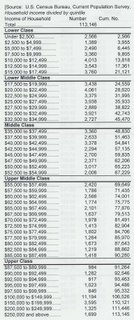What social class are you in? Upper? Middle? Lower?
Look at the following graph of a 2005 Census Bureau study about income:
 How much does your household make? I'll ask again: What social class are you in?
How much does your household make? I'll ask again: What social class are you in?
Chances are your answers are different. Most of us say that we're middle class, even if we think we're a little above that. For some reason, there's a certain stigma in American society with saying you're in the upper or lower classes when it comes to income. Middle class is a safe answer, a safe place to be, and safe place to tell others you belong, should that need arise.
But, before you answer or think to yourself next time, be honest. The notion of you telling someone you're middle class when you and your spouse bring home six figures is just plain wrong.
We don't need to begin wearing T-shirts or name tags with our social class on them. But, it does make a difference when someone is living the upper class life and claims to be middle class. It influences their vote. It influences where they live. It influences who they are.
Based on this data, all of our lawmakers in DC are upper class. No wonder they vote as they do.
So what does this mean other than being honest with ourselves?
In America, income and social class divides us as much as race (the two are deeply related, in my opinion). If we are to build broad-based coalitions that work for change, we must be able to understand the differences that exist between us based on our paychecks. Until we are honest and realize that we live different lives and therefore defend different things, we may never be able to sit at the same table.
Saul Alinsky, the godfather of community organizing, had this to say 35 years ago:
Organization for action will now and in the decade ahead center upon America's white middle class. That is where the power is. When more than three-fourths of our people from both the point of view of the economics and of their self-identification are middle class, it is obvious that their action or inaction will determine the direction of change. Large parts of the middle class, the "silent majority," must be activated; action and articulation are one, as are silence and surrender.
Most Americans are some form of the middle class. And the rest of us say we are. Thus, the burden to act and bring about change is upon all of us who claim that position.
Your middle class-ness means more than fitting in. It means it's time to shake things up.